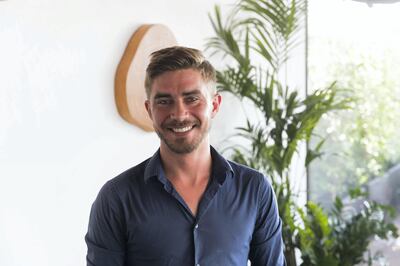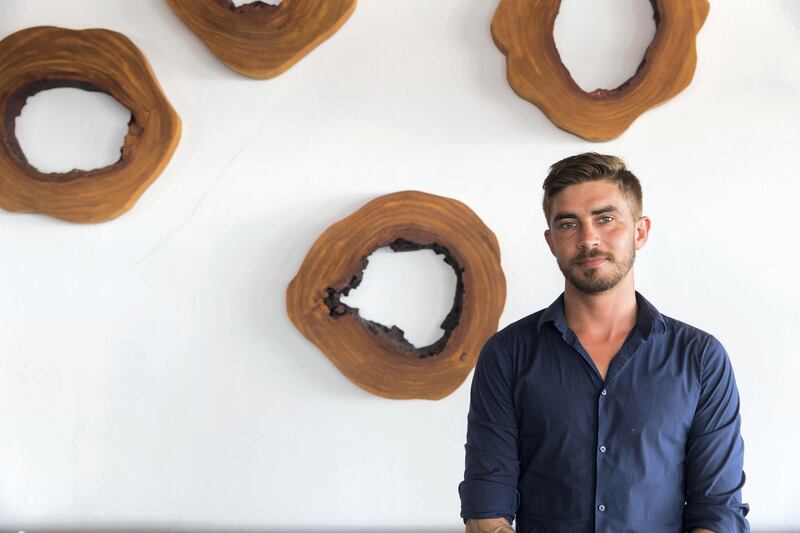Ryan Fourie is beverage manager at Azure Beach, a pool/beach club and dining destination at Rixos Premium Dubai. Born in South Africa, the 28-year-old was adopted by a family friend in Auckland, New Zealand at the age of 10 when he lost his parents to sudden illness. Mr Fourie returned to Cape Town at 18 to reunite with elder siblings and study automotive engineering, plumbing and electrical. While studying he became hooked on the hospitality industry and moved to Dubai two years ago, later switching to Rixos. Mr Fourie, who lives on The Walk, JBR, reveals an emotive money journey.
How did your upbringing drive your attitude towards money?
My mother was a stay-at-home mum, my father a musician so I wasn’t born into money. My father would scrape everything together to pay the rent, so I was brought up with being very careful. I still am. I’ve had to work for my money from the age of 16. I got my first job in New Zealand and was paying my own school fees.
How did losing your parents at such a young age affect your relationship with money?
It happened so suddenly my family was left with nothing. It scared me a lot. If I think of having children myself…I worry that I one day I might leave my children in the same position I was left in. So I’m saving so that one day, when I do pass, I have something to leave for my family. Family is extremely important to me. If it wasn’t for my brother and sister I don’t know where I would be today. We’re very close, probably to do with my parents passing when I was so young, I’m determined to start a family when I’m younger so I can get as much time in as possible.
What got you into the hospitality industry?
While I was studying automotive engineering I kept two jobs, both in bars to pay the bills. Once I had finished engineering studies, I started studying plumbing and electrical skills. I got my degree and became a qualified plumber. At 23 I had my trade license, worked as a plumber for about six months … and hated it. I had a goal to learn the trade, open a company manufacturing and installing solar powered geysers. I soon realised this wasn’t right for me. I quit and went back to the service industry while I re-evaluated my future. I had such passion for hospitality that I had to get back into it.
What were you paid in your first job?
I was 16 earning NZ$11 (Dh28) an hour working in telemarketing, for a company selling Christmas cards made by cancer patients. I was cold calling people who were eating their dinner. It was the hardest job. It was coming up to Christmas and I was trying to sell them a card ... it’s the last thing they want to hear and they weren’t the politest people in the world.
So that job didn’t put you off hard work?
Absolutely not, but it taught me ‘be nicer to people’. I did that for a year. After a while I felt like telling people ‘can’t you just be nicer’. There’s no harm in just saying ‘sorry, I’m not interested’. I was just doing a job.
How did you end up in the UAE?
I became general manager of Cape Town’s biggest luxury nightclub. One night I had a customer offer me a job in Dubai. Within two weeks I was on a plane. It wasn’t a plan to move to the UAE; it just happened … perfect timing. My only regret is I didn’t move here sooner. I’m excited to see what the next two years brings. Now I’m focused on beach clubs and restaurants I don’t think I’ll go back to nightclubs.
Are you a spender or a saver?
When I didn’t have money I was a spender. Now that I’m starting to make money, I’m starting to save. I try to save at least 25 per cent of my salary every month. My main expense is rent. The company provides me with food and I live across the road so I walk to work.
Where do you save?
In a South African bank savings account. Once it’s in I don’t touch it. Distance helps. Every time I put money in I see it times by four because of the exchange rate and it makes me a lot happier. There was one month where the Rand was doing really badly; I was making quite a bit off the exchange rate.
_______
Money & Me: 'I paid the school fees late to bootstrap my Abu Dhabi business'
Money & Me: 'We took out a 100 per cent mortgage on our first property'
_______
What is your philosophy towards money?
It’s got a good side, and bad side. You get to create amazing memories out of it. Also you’ll see in Dubai how little money means to some. In South Africa I’ve seen how much money can mean. I know very happy people who have absolutely nothing. Money can fix a lot of problems, but doesn’t create happiness. I’m saving now so that one day I have something to leave my family.
What is your most cherished purchase?
My father had a 1988 Jackson Chevelle guitar signed by Steve Morse (Deep Purple guitarist). He had gone to Paris to open for Deep Purple. When my father passed we auctioned it for 69,875 South African Rand (Dh18,148) at a benefit concert to raise money for my brother Ricky, sister Samantha, and myself. At 23 I found the guy that bought it, to buy it back. It was hanging on his wall. He couldn’t believe it because he’d seen me as a kid and to have me knock on his door …he was blown away, so he gave it to me for next nothing. It only set me back what it cost him to build the glass case. Now I’ve got it hanging on my wall.
Do you prefer paying by cash or credit card?
Debit card. I hate carrying money, carrying change. For a couple of months, when I joined this company, they couldn’t pay into my bank until the visa was sorted out so were paying me cash. I have a credit card; now I’ve paid it back it’s locked away.
What is your best investment?
Going to university. I learned a world of knowledge. It was also going through that that led me to the path I want to be on. I always had this fear that I was going to miss the thing I’m meant to do. I didn’t, but only because I was studying – and bar working. I see plumbing and engineering as something I can fall back on.
Is there anything you regret spending money on?
Just before I came to Dubai I bought an old box-shaped BMW 318 in Cape Town. I was spending so much money on the daily commute and was sick of looking for a car. It seemed OK but kept over-heating. Within about a week I had to pretty much leave the car on the side of the road. It completely gave up. It was a lot of money; borrowed money. I didn’t get anybody to check it; I just bought it - such a mistake. I’m a lot more careful now, not rushing into purchases. I take time and make sure everything is legit.

Do you have a long-term plan?
There’s a property in the future I would like to be purchasing. It’s cheap for me to invest (in South Africa), but I don’t see myself moving back. I would get my family to find the property, and I’d rent it out. My girlfriend is from France and into marketing. We met here. Hopefully by the end of the year we’ll be engaged. The plan is most likely move to France, somewhere in Europe, open a little coffee shop, restaurant; long-term, have a property that is ours. It is possible to start a family on the salary I’m on at the moment.
What would you raid your savings for?
It would have to be something to do with family, if they needed money for anything. My brother’s got a wedding coming up; I might do some raiding for that, maybe pay for the honeymoon.






